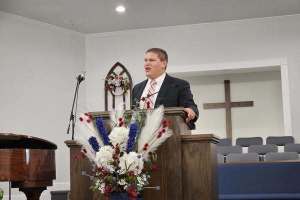Louie Giglio and How the White House Spells Diversity
The Rev. Louie Giglio, who was once invited to deliver the benediction at the upcoming U.S. presidential inaugural, has withdrawn. The ruckus was over what the minister said to his congregation fifteen years ago.
If you want to hear God's voice, that is his voice to this issue of homosexuality. It is not ambiguous and unclear. It is very clear. If you look at the counsel of the word of God, Old Testament, New Testament, you come quickly to the conclusion that homosexuality is not an alternate lifestyle. . . . is not just a sexual preference, homosexuality is not gay, but homosexuality is sin. It is sin in the eyes of God, and it is sin according to the word of God.
The White House was pressed to reconsider, and in conversations with the pastor, the record shows he decided not to offer the prayer. The White House's response to his decision was, "Choosing an affirming and fair-minded voice as his replacement would be in keeping with the tone the president wants to set for his inaugural."
Regardless of the internal process, or conversations between the two, this issue goes to the heart of our society. Giglio was pressured to withdraw because his views on a particular sexual practice were not in line; he was seen not to be "fair-minded," a not surprising comment when pluralism is set aside as the functioning model of public life.
While many disagree with his view, what is at stake is how society deals with disparate opinions and perspectives. The minister was doing what one in his calling is to do: inform the congregation on matters of importance. And in today's world, how can a person responsible for the spiritual well being of their congregation avoid matters of sexuality?
What are imams, priests, rabbis and pastors to do? World wide his views would not be inconsistent with most 600 million Evangelical Protestants. I suspect a number within the 500 million World Council of Churches (including main-line Protestants, Anglicans and Orthodox) and many in the over one billion Roman Catholics, would also support his basic assumption.
Within the heat of this debate, as a liberal, secular democracy these factors matter.
First the framework (pluralism) of our social structure allows a plurality of views: The right of persons to hold and publicly debate matters is central to life. Within the communities of that plurality, it also matters that they, (in this case a church) with respect, teach their people what they believe to be biblically informed.
Second, the public square is where we live and breathe. When one group disagrees even with the majority's consensus, it should not rule them out as participants.
Third, while we want our state to be secular – meaning the state does not give preference to a religious group – that does not mean religious views have no place within the public square. It matters that we distinguish between secular (freedom of religion) and secularism (freedom from religion). Secular is our standard, not secularism.
Fourth, all members of society are just that, having full access to their rights and privileges. Sexual preferences, within the law, do not disallow any citizen of those rights.
Fifth, while members of a society are to be responsible and understanding of others in society, pluralism affirms the right and responsibility of each to live according to its beliefs and guidelines.
What has emerged from this decision is this: because his views don't affirm a particular sexual behavior, by implication he isn't fair minded and therefore has no place in their public forum. Nothing indicates the minister tried to impose his views or exclude anyone from their rights or place in society. Rather his view became the litmus test, a manifest expression of another kind of intolerance.
Why was he invited in the first place? The White House told us: "Pastor Giglio was asked to deliver the benediction in large part for his leadership in combating human trafficking around the world." His track record is one of caring for the disenfranchised, those overcome by power. Yes it was this sense of fairness which impressed the White House.
Exclusion is an easy way to disenfranchise. The White House described its internal rational, "… they don't reflect our desire to celebrate the strength and diversity of our country at this Inaugural."
Diversity is key to societal fairness, and to allow it to flourish it must be practiced.





























